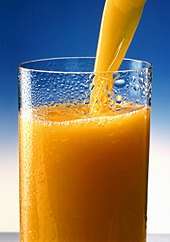Cucumber juice

Cucumber juice is the juice derived from cucumbers produced by squeezing or pressing it.[1] Cucumbers are 98% water.[2]
Cucumber juice is used in beverages such as cocktails such as the Bloody Mary,[3] dishes such as cucumber soup,[4] and in dips and salad dressings, such as green goddess dressing.[5] Cucumber juice has significant amounts of potassium[1] and is high in vitamin A.[6] It also contains significant amounts of silicon.[1] It also contains sterol.[7]
| Nutritional value per 1 ounce | |
|---|---|
| Energy | 9 kcal (38 kJ) |
|
1 g | |
| Vitamins | Quantity %DV† |
| Vitamin C |
2% 2 mg |
| Minerals | Quantity %DV† |
| Calcium |
4% 40 mg |
| Iron |
1% .1 mg |
| Potassium |
1% 41 mg |
| Sodium |
0% 2 mg |
|
Nutritional content source: [8] | |
| |
| †Percentages are roughly approximated using US recommendations for adults. | |
Cucumber juice is used as an ingredient in cosmetics, soaps, shampoos, and lotions,[9] [10] and in Eau de toilette and perfumes.[11]
It was used in Russian traditional medicine to aid in the treatment of respiratory tract inflammation and to reduce lingering cough.[12] In other traditions it was used to soothe heartburn and reduce acid in the stomach.[13] For skin it has been used to soothe burns and rashes.[13][12][14] Cucumber juice has been described as a repellent against wood lice and fish-moths.[14]
See also
References
- 1 2 3 Balch, P.A. (2003). Prescription for Dietary Wellness. Avery. p. 36. ISBN 978-1-58333-147-7.
- ↑ Curtis, Susan; Thomas, Pat; Vilinac, Dragana (2013). Healing Foods. DK Publishing. p. 58. ISBN 978-1-4654-1631-5.
- ↑ O'Hara, C.B.; Nash, W.A. (1999). The Bloody Mary: A Connoisseur's Guide to the World's Most Complex Cocktail. Lyons Press Series. Lyons Press. p. 92. ISBN 978-1-55821-786-7.
- ↑ Sharma, R. (2005). Diet Management Guide. A.H.W. Sameer series. Diamond Pocket Books. p. 179. ISBN 978-81-288-1085-5.
- ↑ Hesser, A. (2010). The Essential New York Times Cookbook: Classic Recipes for a New Century. W. W. Norton. p. 142. ISBN 978-0-393-24767-1.
- ↑ Watson, R.R. (2014). Diet and Exercise in Cystic Fibrosis. Elsevier Science. p. 104. ISBN 978-0-12-800588-0.
- ↑ Earl Mindell's Food as Medicine. Pocket Books. 2002. p. 119. ISBN 978-0-7432-2662-2.
- ↑ "Calories in Raw Cucumber Juice". Myfitnesspal.com. Retrieved 16 April 2015.
- ↑ Katsambas, A.D.; Lotti, T.M. (2003). European Handbook of Dermatological Treatments. Springer. p. 473. ISBN 978-3-540-00878-1.
- ↑ Digest, E.R. (2015). The Ultimate Book of Vegetables: Gardening, health, Beauty, Crafts, Cooking. Readers Digest. p. 646. ISBN 978-1-62145-223-2.
- ↑ N.A.R.D. Notes. National Association of Retail Druggists. 1911. p. 649.
- 1 2 Zevin, I.V.; Altman, N.; Zevin, L.V. (1997). A Russian Herbal: Traditional Remedies for Health and Healing. Inner Traditions/Bear. pp. 65&ndash, 66. ISBN 978-0-89281-549-4.
- 1 2 Shealy, C.N. (2012). The Healing Remedies Sourcebook: Over 1000 Natural Remedies to Prevent and Cure Common Ailments. Da Capo Press, Incorporated. p. 75. ISBN 978-0-7382-1595-2.
- 1 2 Duke, J.A. (1993). CRC Handbook of Alternative Cash Crops. Taylor & Francis. p. 203. ISBN 978-0-8493-3620-1.
Further reading
- Tremblay, Sylvie (April 16, 2015). "The Benefits of Cucumber Juice". SFgate.com. Retrieved April 17, 2015.
- Hui, Y.H.; Ghazala, S.; Graham, D.M.; Murrell, K.D.; Nip, W.K. (2003). Handbook of Vegetable Preservation and Processing. Food Science and Technology. Taylor & Francis. p. 190. ISBN 978-0-8247-5665-9.
